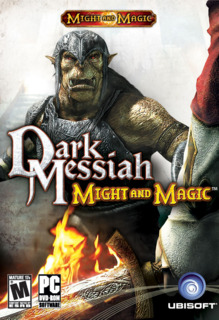Excellent combat system and fantasy setting raise Dark Messiah over the grey mass of average shooters.
Unlike the name suggests, Dark Messiah of Might and Magic is not a RPG. The game offers few RPG elements including character development and even a couple choices but the game is still a fantasy themed shooter at heart. M&M has had several spin-off series over the years, the most famous being the turn-based strategy Heroes of Might and Magic but also some less known ones, and Dark Messiah could be counted as the newest addition to these spin-offs.
What really separates Dark Messiah from other Might and Magics is the Valve's Source engine it utilizes. Now four years after the release of Half-Life 2, both the engine and the graphics are starting to show their age and while still scaling quite well, Dark Messiah is a bigger system hog than most other Source games. Though Dark Messiah can still look very pretty, especially in combat.
Evil villain? Check. Love affair? Check. Nasty enemies swarming at you from every angle? Check. The story is the usual B-cIass fare we've learned to live with in most games. You are the apprentice of the powerful wizard Phenrig and soon after the short tutorial level, you are sent to help your master's wizard friend to obtain the Skull of Shadows. As your guide, a demonic spirit Xana is implemented into your head. Many players may find her optimistic and hot 'n dirty attitude irritating sooner or later. Thankfully, you'll have the option to get rid of her later in the game. Unsurprisingly, things don't go as planned and before you notice, you'll find yourself in a castle siege with mayhem everywhere. Read through the manual and you can guess the rest. After dozens of World War 2 and sci-fi shooters, fantasy-theme is strangely refreshing in the shooter genre.
We've seen direction and power attacks before but what really sets the combat in Dark Messiah apart from other games is the excellent use of Source physics engine. Thanks to it, melee combat is actually fun and rewarding, and the gory death animations are always a joy to watch. Also, the game brings back something that disappeared after the massive popularity of Gordon Freeman; you can actually see your body. And your legs aren't just visible - they also work. With a button press you can kick your enemies to fire, down the stairs and off ledges. All this may feel a bit overpowered at first but cranking up the difficulty does wonders. The melee combat in Dark Messiah is arguably the finest in any game.
The game has altogether four alternate endings. That's four times more than linear shooters usually have. But that's not the only place where the roleplaying elements kick in. Through the game, you can choose attributes from four different talent trees. You can either focus on being an assassin, wizard, warrior or archer, or divide your experience on two different trees. You could be a jack of all trades if you wanted, but fortunately unlike in Oblivion, it makes you a major weakling.
Both the score and sound effects are good, whereas voice acting is average at best. What is lost with the voice acting is gained back with the great ambient sounds making every area more or less creepy. All in all, the audio gets the job done without hurting the immersion.
Most of the major technical problems and bugs that haunted the release version have been fixed by now and it's been almost a year since the last patch so this is as good as it gets. There are still few crashes on some systems but they are not game breaking anymore.
While the singleplayer is developed by Arkane, the multiplayer side is Kuju's handiwork. You'll find the normal deathmatch and capture the flag game modes but only the crusade mode that resembles Battlefield's conquest mode is even mildly interesting. All the four singleplayer classes are in multiplayer too but the attributes are pre-determined. It can also be mildly annoying to join the game midway through the round when everyone already has a wide range of special attacks and you struggle to gain even few kills. The sometimes horrid performance in singleplayer gets even worse in multiplayer with several mages casting massive fireballs at the same time. Though if you have an up-to-date system with a DirectX10 card and a dual core processor, the performance won't be a problem in either.
The first playthrough takes a good 15 hours which is more than enough for a shooter. And with the four different play styles and endings, it's definitely worth playing through the game again. While the multiplayer is fun for only couple evenings at max, the fun singleplayer is easily worth the ten to twenty dollars the game currently costs.

